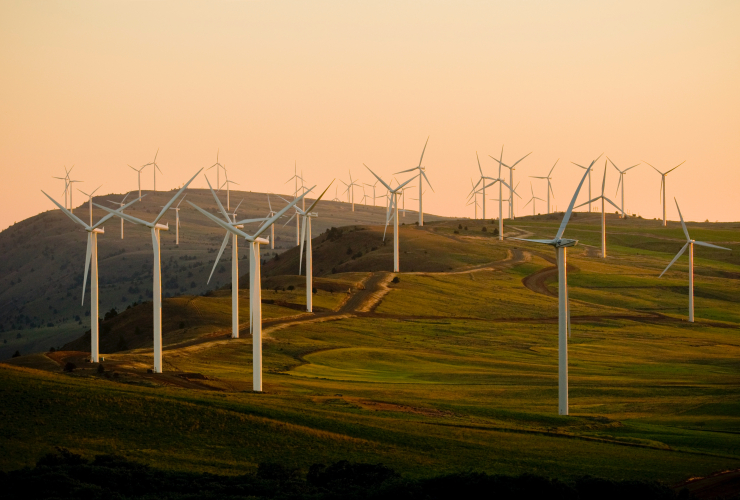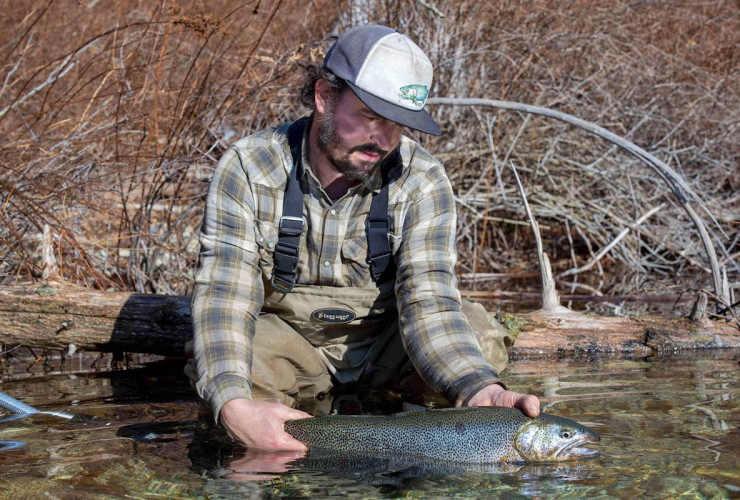The financial support Canada is offering for the clean energy transition is competitive with the Inflation Reduction Act (IRA) south of the border, a new report from TD Economics says.
The report Monday essentially refutes the arguments made in recent months by Canadian business leaders, who have held up the U.S. IRA as the gold standard in the global race for energy transition investment.
TD said it has crunched the numbers and the government of Canada has spent $139 billion since budget 2021, or five per cent of the country's nominal GDP, on supports for clean energy development.
The bank said this compares favourably to the U.S. Inflation Reduction Act’s estimated US$393 billion in spending, or 1.5 per cent of that country's nominal GDP.
"Despite criticism, Canada’s financial support for the clean energy transition is yielding positive results and has established a competitive position relative to the U.S," the report's author, TD managing director and senior economist Francis Fong, wrote.
The IRA, signed into law by President Joe Biden last year, is the United States's most ambitious piece of climate legislation ever. It offers about US$375 billion in new and extended tax credits for everything from renewable electricity generation to hydrogen production to sustainable jet fuel usage to help the U.S. clean energy industry get off the ground.
Here in Canada, some companies have said the U.S. incentives are so attractive that it's impossible to compete.
In February, Calgary-based fuel producer Parkland Corp. announced it would not go ahead with its plan to build a stand-alone renewable diesel complex at its refinery in Burnaby, B.C., in part because the company believes the incentives offered by the IRA give an advantage to producers south of the border.
Bob Larocque, president and CEO of the Canadian Fuels Association, said there are other companies on the verge of shelving their Canadian project proposals.
He said the reason is because clean fuel projects in the U.S. are eligible for a guaranteed tax credit on their fuel production, while in Canada, the only thing the industry received in the most recent federal government was a pledge for further consultations.
"We have $10 billion of announced investment in Canada over the last two years, which are all being re-evaluated due to the impact of the IRA," said Larocque, president and CEO of the Canadian Fuels Association, in an interview.
For its part, Ottawa has been clear all along that it knows it must do more to stay competitive with the U.S. on clean energy development.
In the federal budget last month, Finance Minister Chrystia Freeland announced commitments for investments in clean electricity, cleantech manufacturing, and hydrogen that together are expected to cost some $55 billion through to the 2034-35 fiscal year.
But Michael Bernstein, executive director of the climate policy organization Clean Prosperity, said the problem isn't how much Canada is spending — it's how it is spending.
He said Canada has announced billions of dollars of investment into programs like the Net Zero Accelerator, the Strategic Innovation Fund and the Canada Infrastructure Bank. All of these organizations in return have been tasked with funding proposals that support Canada's climate goals.
But Bernstein said this kind of a system isn't as effective as a clear-cut system of tax credits, such as exists in the U.S.
"It’s great that there’s tens of billions in these different funds, but if I'm an investor — say, a proponent of hydrogen — I have no idea what that means for my facility," he said.
"I have no clue how much I’m going to get, whereas in the U.S. it's very clear. There's this up-front certainty about what kind of support I'm going to get from the federal government."
The TD report pointed out that regardless of total dollar figure, the per unit subsidies offered in Canada are in some cases significantly less than their U.S. counterparts.
"However, this has not stopped Canada from securing significant domestic and international investments," Fong said, adding that TD estimates Canada has received $17.4 billion in electric vehicle and battery plant investment announcements since 2021.
Just last week, the federal government committed to up to $13 billion in subsidies over the next decade, in order to see Volkswagen build its first overseas battery manufacturing plant in southwestern Ontario.
"Canada’s position in this supply chain is not exclusively a function of subsidies and climate policies," Fong said. "Importantly, proximity to critical minerals is one of the primary draws of investment initiatives."
The TD report pointed out that Canada has a carbon pricing system and the U.S. does not, which in effect means U.S. subsidies have to be larger to make investing in clean energy make sense economically.
TD went on to say that it's not a lack of government funding that poses the greatest risk to Canadian competitiveness, but a lack of skilled talent as well as the lengthy amount of time it takes to build major infrastructure projects in this country.
The report suggested Canada must focus on expediting project assessments, speeding up mine development times, and refocusing policy on labour force skills and training if it wants to attract clean energy investment.
This report by The Canadian Press was first published April 24, 2023.
Companies in this story: (TSX:TD)
TD went on to say that it's
TD went on to say that it's not a lack of government funding that poses the greatest risk to Canadian competitiveness, but a lack of skilled talent as well as the lengthy amount of time it takes to build major infrastructure projects in this country.
It takes a long time because Canadians don't want an expansion of dirty energy nor pipelines across the land but TD is too ignorant of anything that doesn't generate profits.
In an email, TD spokesperson Thomas Chanzy said the bank doesn’t disclose specific numbers around fossil fuels or renewable energy financing but that it recognizes the “critical business and environmental challenge of climate change,” and pointed to the bank’s 2050 net-zero goal.
Bulls*t goals that mean nothing because in 2050 you may not be alive.
Canadian banks are a disgrace to the environment and spinning bovine excrement won't change that.......Canada’s largest banks have signed a new deal to pump $1.5 billion into Enbridge that will help the oil and gas company expand its pipeline network, with the vast majority of that money referred to as “sustainability linked” in the term sheets.
By John Woodside | News, Energy, Ottawa Insider | September 27 2021
"$139 billion since budget
"$139 billion since budget 2021" on clean energy development?
Or measures to extend the lives of fossil fuel rackets?
I'd love to see Mr. TD's breakdown ...




Comments